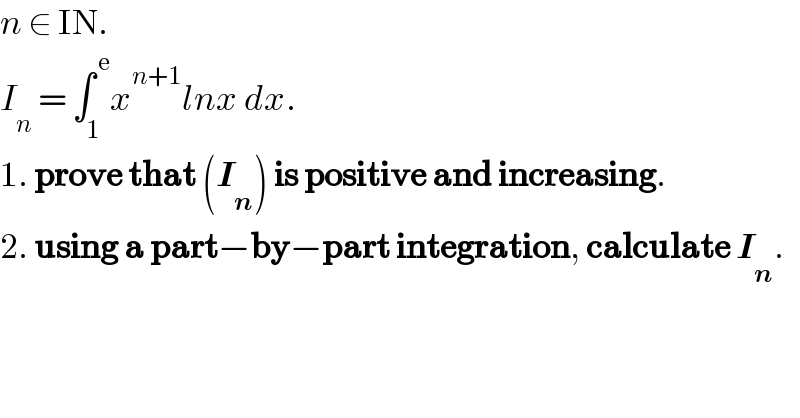Question Number 143702 by henderson last updated on 17/Jun/21

$${n}\:\in\:\mathrm{IN}. \\ $$$${I}_{{n}} \:=\:\int_{\mathrm{1}} ^{\:\mathrm{e}} {x}^{{n}+\mathrm{1}} {lnx}\:{dx}. \\ $$$$\mathrm{1}.\:\boldsymbol{\mathrm{prove}}\:\boldsymbol{\mathrm{that}}\:\left(\boldsymbol{{I}}_{\boldsymbol{{n}}} \right)\:\boldsymbol{\mathrm{is}}\:\boldsymbol{\mathrm{positive}}\:\boldsymbol{\mathrm{and}}\:\boldsymbol{\mathrm{increasing}}. \\ $$$$\mathrm{2}.\:\boldsymbol{\mathrm{using}}\:\boldsymbol{\mathrm{a}}\:\boldsymbol{\mathrm{part}}−\boldsymbol{\mathrm{by}}−\boldsymbol{\mathrm{part}}\:\boldsymbol{\mathrm{integration}},\:\boldsymbol{\mathrm{calculate}}\:\boldsymbol{{I}}_{\boldsymbol{{n}}} . \\ $$
Answered by mindispower last updated on 17/Jun/21
![ln(x)≥0,∀x≥1 ⇒∫_1 ^e x^(n+1) ln(x)≥∫_1 ^e 0.dx=0 2 I_n =[(x^(n+2) /(n+2))ln(x)]_1 ^e −(1/(n+2))∫_1 ^e (x^(n+2) /x)dx (e^(n+2) /(n+2))−(1/((n+2)^2 ))[x^(n+2) ]_1 ^e =(((n+1)e^(n+2) +1)/((n+2)^2 ))](https://www.tinkutara.com/question/Q143703.png)
$${ln}\left({x}\right)\geqslant\mathrm{0},\forall{x}\geqslant\mathrm{1} \\ $$$$\Rightarrow\int_{\mathrm{1}} ^{{e}} {x}^{{n}+\mathrm{1}} {ln}\left({x}\right)\geqslant\int_{\mathrm{1}} ^{{e}} \mathrm{0}.{dx}=\mathrm{0} \\ $$$$\mathrm{2}\:{I}_{{n}} =\left[\frac{{x}^{{n}+\mathrm{2}} }{{n}+\mathrm{2}}{ln}\left({x}\right)\right]_{\mathrm{1}} ^{{e}} −\frac{\mathrm{1}}{{n}+\mathrm{2}}\int_{\mathrm{1}} ^{{e}} \frac{{x}^{{n}+\mathrm{2}} }{{x}}{dx} \\ $$$$\frac{{e}^{{n}+\mathrm{2}} }{{n}+\mathrm{2}}−\frac{\mathrm{1}}{\left({n}+\mathrm{2}\right)^{\mathrm{2}} }\left[{x}^{{n}+\mathrm{2}} \right]_{\mathrm{1}} ^{{e}} \\ $$$$=\frac{\left({n}+\mathrm{1}\right){e}^{{n}+\mathrm{2}} +\mathrm{1}}{\left({n}+\mathrm{2}\right)^{\mathrm{2}} } \\ $$$$ \\ $$
Answered by mathmax by abdo last updated on 17/Jun/21
![1) we have 1≤x≤e ⇒x^(n+1) logx≥0 and I_(n+1) −I_n =∫_1 ^e (x^(n+2) −x^(n+1) )logx dx =∫_1 ^e x^(n+1) (x−1)logx dx≥0 ⇒ I_n is increazing 2) by parts I_n =[(x^(n+2) /(n+2))logx]_1 ^e −∫_1 ^e (x^(n+1) /(n+2))dx =(1/(n+2))−(1/(n+2))[(1/(n+2))x^(n+2) ]_1 ^e =(1/(n+2))−(1/((n+2)^2 ))(e^(n+2) −1) =((n+2−(e^(n+2) −1))/((n+2)^2 )) =((n+3−e^(n+2) )/((n+2)^2 ))](https://www.tinkutara.com/question/Q143729.png)
$$\left.\mathrm{1}\right)\:\mathrm{we}\:\mathrm{have}\:\mathrm{1}\leqslant\mathrm{x}\leqslant\mathrm{e}\:\Rightarrow\mathrm{x}^{\mathrm{n}+\mathrm{1}} \mathrm{logx}\geqslant\mathrm{0}\:\mathrm{and} \\ $$$$\mathrm{I}_{\mathrm{n}+\mathrm{1}} −\mathrm{I}_{\mathrm{n}} =\int_{\mathrm{1}} ^{\mathrm{e}} \:\left(\mathrm{x}^{\mathrm{n}+\mathrm{2}} −\mathrm{x}^{\mathrm{n}+\mathrm{1}} \right)\mathrm{logx}\:\mathrm{dx}\:=\int_{\mathrm{1}} ^{\mathrm{e}} \mathrm{x}^{\mathrm{n}+\mathrm{1}} \left(\mathrm{x}−\mathrm{1}\right)\mathrm{logx}\:\mathrm{dx}\geqslant\mathrm{0}\:\Rightarrow \\ $$$$\mathrm{I}_{\mathrm{n}} \mathrm{is}\:\mathrm{increazing} \\ $$$$\left.\mathrm{2}\right)\:\mathrm{by}\:\mathrm{parts}\:\mathrm{I}_{\mathrm{n}} =\left[\frac{\mathrm{x}^{\mathrm{n}+\mathrm{2}} }{\mathrm{n}+\mathrm{2}}\mathrm{logx}\right]_{\mathrm{1}} ^{\mathrm{e}} −\int_{\mathrm{1}} ^{\mathrm{e}} \:\frac{\mathrm{x}^{\mathrm{n}+\mathrm{1}} }{\mathrm{n}+\mathrm{2}}\mathrm{dx} \\ $$$$=\frac{\mathrm{1}}{\mathrm{n}+\mathrm{2}}−\frac{\mathrm{1}}{\mathrm{n}+\mathrm{2}}\left[\frac{\mathrm{1}}{\mathrm{n}+\mathrm{2}}\mathrm{x}^{\mathrm{n}+\mathrm{2}} \right]_{\mathrm{1}} ^{\mathrm{e}} \:=\frac{\mathrm{1}}{\mathrm{n}+\mathrm{2}}−\frac{\mathrm{1}}{\left(\mathrm{n}+\mathrm{2}\right)^{\mathrm{2}} }\left(\mathrm{e}^{\mathrm{n}+\mathrm{2}} −\mathrm{1}\right) \\ $$$$=\frac{\mathrm{n}+\mathrm{2}−\left(\mathrm{e}^{\mathrm{n}+\mathrm{2}} −\mathrm{1}\right)}{\left(\mathrm{n}+\mathrm{2}\right)^{\mathrm{2}} }\:=\frac{\mathrm{n}+\mathrm{3}−\mathrm{e}^{\mathrm{n}+\mathrm{2}} }{\left(\mathrm{n}+\mathrm{2}\right)^{\mathrm{2}} } \\ $$
